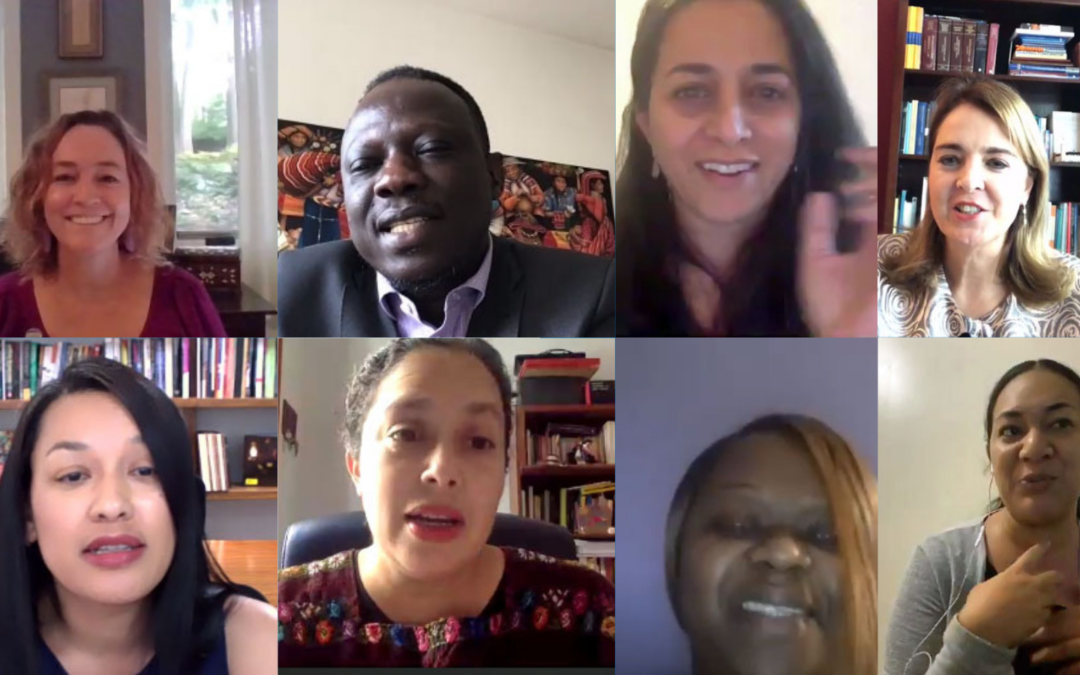
Oct 21, 2020
Even as gender equality and women’s fundamental rights are under attack around the world, women activists and their unions and organizations are standing up to the challenges and pushing back, panelists said yesterday during the launch of a landmark report, “Celebrating Women in Civil Society and Activism” with Clément Voule, United Nations Special Rapporteur on the rights to freedom of peaceful assembly and of association.
“Women around the world are building economic power by exercising freedom of association and assembly,” said Solidarity Center Executive Director Shawna Bader-Blau. “Unions and the right to collective bargaining is one way we fight back.” (Watch the event here.)
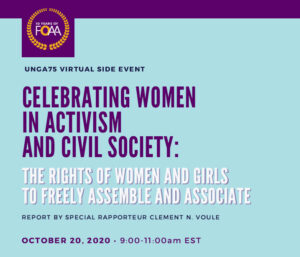 “Courageous women and organizations are pushing back,” said Bahia Tahzib-Lie, Netherlands Ambassador for Human Rights in her opening remarks. “They make clear that women’s voices can no longer be ignored or silenced.”
“Courageous women and organizations are pushing back,” said Bahia Tahzib-Lie, Netherlands Ambassador for Human Rights in her opening remarks. “They make clear that women’s voices can no longer be ignored or silenced.”
The virtual side event, co-sponsored by the Solidarity Center, brought together women civil society leaders from around the world to discuss the findings of the report, prepared by Voule, who is presenting the report to the UN General Assembly this week.
“Women’s organizations and movements and their contribution to activism and civil society continued to be undervalued,” Voule said, highlighting one of the report’s key findings. Their ability to freely form unions and associate is key to their ability to create positive change, according to the report. Yet these rights increasingly are being violated, he said.
“Women are 50 percent of the population” but are often targeted by harassment and other forms of violence when they seek to form unions to improve their workplaces, he said, one of the report’s many findings informed by the experiences of many Solidarity Center partners.
Gender-Based Violence Undermining Women’s Basic Rights

“All forms of gender-based violence and harassment must end,” says UN Special Rapporteur Clément Voule.
Crucially, the report finds that gender-based violence and harassment (GBVH) is “perhaps the fiercest form of reprisal to the exercise of the rights to freedom of peaceful assembly and of association for women workers.”
Gender-based violence begins at home for women and continues to all aspects of public space: “to the streets and the workplace and the public sphere,” said Voule, and COVID-19 lockdowns have worsened the violence women face at home.
The pandemic also has increased the violence women face at work, said Bader-Blau. But a new treaty the International Labor Organization approved last year creates the fundamental right to be free from violence and harassment at work by addressing the root causes of gender-based violence which often also involve race, ethnicity and gender identity.
The treaty, Convention 190, “demands employers and governments make real changes,” she said. “The treaty calls for employers to negotiate directly with workers. No longer can we look at workplace as the private sphere of the employer where workers give up their rights.”

Unions and the right to collective bargaining is one way we fight back”—Shawna Bader-Blau.
Unions and other activists are campaigning for their governments to ratify C190, a difficult process, but one that creates the opportunity for coalition building and cross-movement building among unions, feminist organizations and our allies, said Bader-Blau.
Voule also pointed out how the pandemic has been used to limit the space for civil society, with women especially targeted. “COVID-19 has increased criminalization of women’s rights organizations and harassment against women exercising their rights to peaceful assembly and association with worrisome reports on the misuse of emergency measures, application of criminal laws or limiting public gatherings.”
Progress, Challenges from Beijing +25
This year marks the 25th anniversary of the Fourth World Conference on Women and UN adoption of the Beijing Declaration and Platform for Action on advancing women’s rights, a landmark panelists said should be celebrated, but also reinforced and built upon.

World leaders are now talking about gender equality, but only due to the efforts of grassroots women activists, says Nicolette Naylor.
“Over the last 25 years, we have gone from zero laws, zero resolutions to over 120 laws and resolutions to protect gender equality,” said Nicolette Naylor at the Ford Foundation. “It shows us that progress is possible. This is thanks to women on the ground pushing for change. It’s because of the mobilization of women’s rights organizations and feminists on the ground.”
Making progress on ending gender inequality means involving women and ensuring their voices are heard, according to panelists who reinforced the report’s recommendations that “effective strategies to address violations of women’s rights to freedom of peaceful assembly and association should be grounded in supporting and empowering women’s movements and organizations in all their diversity.”
“Many women on the ground led the way. Now we need to create more space for women to get places they deserve so they can push forward these agendas,” said Mireille Tushiminina from the Cameroon Women’s Peace Movement. “To hold our governments accountable, we need to be part of the conversation. Women are at the forefront and need to be in the conversation.”
Uma Mishra-Newbery at the Women’s March Global moderated the panel, which also included Marusia López from the Mesoamerican Network of Women Human Rights Defenders and Masina Fusi at Her Voice.
Event co-sponsors included Access Now, CIVICUS, Freedom House, Geneva Academy, Iniciativa Mesoamericana de Mujeres Defensoras de Derechos Humanos, International Center for Not-for-Profit Law, Women’s Global March, Women’s Major Group and the World Movement for Democracy.
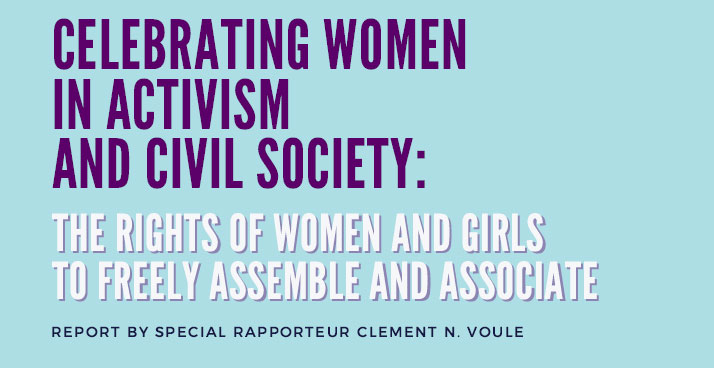
Oct 20, 2020
Women activists and their organizations are the drivers of positive change worldwide—and the freedom to form unions and freely associate is key to their ability to do so, according to a report released today.
“Celebrating Women in Civil Society and Activism,” prepared by Clément Voule, United Nations special rapporteur on the rights to freedom of peaceful assembly and of association, finds these fundamental freedoms empower women to “express their political opinions, engage in … economic and social activities … form and join trade unions and cooperatives, and elect leaders to represent their interests and hold them accountable.”
Yet women’s voices are undervalued, the report states, even as government, employers and others violate women’s rights, with many women experiencing an increase in severe violations of these fundamental freedoms and backlashes against gender equality. Exclusions from labor laws, barriers to forming and joining unions and reprisals for labor organizing leave women with “little leverage to change the conditions that entrench poverty, fuel inequality and limit democracy.”
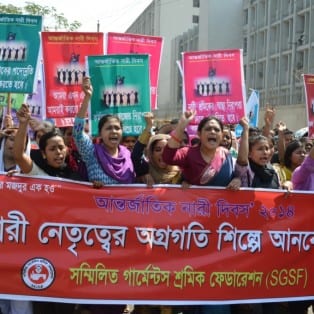
Women’s exclusion from labor laws and reprisals for forming unions in Bangladesh and around the world limit women’s ability to improve their workplaces. Credit: Solidarity Center
For instance in Bangladesh, “in many cases when garment workers want to unionize, they are blacklisted, intimidated, local groups threaten their families and many women are subject to physical assault,” says Nazma Akter, Awaj executive director and president of the Sommilito Garments Sramik Federation (SGSF). “There is no robust legal mechanism to appeal to for the right to organize and to help protect our human rights.”
Women seeking to improve their working conditions face similar challenges around the world, including in Ghana, where women “often are threatened with dismissals or non-renewal of contracts,” say Edward Kareweh, general secretary of the General Agricultural Workers’ Union (GAWU) and GAWU Gender Equality Officer Bashiratu Kamal. “There is a lack of cooperation from government in enforcing laws against discrimination, marginalization and exploitation.”
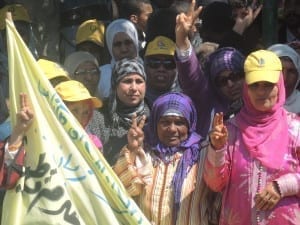
Agricultural workers in Morocco and around the world often are not covered by their countries’ labor laws, a lack of rights that falls especially hard on women. Credit: Solidarity Center/Hind Cherrouk
Laws barring retaliation against women who seek to form unions often are not enforced and additional barriers erected, say women activists.
In El Salvador, “the ability to form and join unions is a constitutional right, but in practice, there are many obstacles, ranging from delay in legal registration, defamatory campaigns, loss of employment, widespread violence, to murder in certain cases, says Marta Zaldaña, Secretary General of the union federation FEASIES.
“Tunisia’s Constitution guarantees equality and equal opportunities for men and women. But despite those important laws, the actual problem is in implementing those laws, especially in the interior regions where male domination prevails,” according to a Tunisian woman union activist.
Nazma, Kareweh, Kamal, Zaldaña and the Tunisian activist were among hundreds of worker rights and human rights activists whose testimony informed the report, which Voule is presenting this week to the UN General Assembly. SGSF, GAWU and FEASIES are Solidarity Center partners.
Gender-Based Violence the ‘Fiercest Form of Reprisal’
The ability of women to freely take action is especially critical now, as the COVID-19 pandemic has worsened the inequalities facing women, in their jobs, homes and communities.
“Faced with narrowing civic space, mounting inequalities and rising fundamentalisms, women have persisted in their fight for structural change, speaking truth to power and building resilience in their communities,” the report states.
Gender-based violence and harassment is “perhaps the fiercest form of reprisal to the exercise of the rights to freedom of peaceful assembly and of association for women workers,” the Special Rapporteur finds.
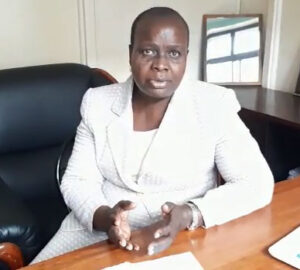
Violence is used as a way of discouraging women from actively participating in unions and seeking leadership positions—Rose Omamo, Metal Workers Union, Kenya. Credit: Solidarity Center
“Gender-based violence against women at work has been on the rise in various places in Kenya. Violence also is used as a way of discouraging women from actively participating in unions/associations and seeking leadership positions,” says Rose Omamo, general secretary of the Amalgamated Union of Kenya Metal Workers, a Solidarity Center partner.
And, when they protest gender-based violence and harassment, women then become targets. “Women workers in Nigeria have been involved in protests against all forms of gender-based, violence and harassment,” says Mercy Okezie, chairperson of the National Women Commission and Nigeria Labor Congress vice president.
“There have been protests against rape and abduction of young girls by terrorists, femicide, sexual harassment in markets and gender-based violence and harassment in the world of work. Some of the women who participated faced … gender-based violence attacks ranging from bullying, sex discrimination to loss of jobs, threats to life and social stigmatization as a result of speaking out or standing up to push for an end to GBVH at home, workplace, their unions and communities.”
Women Must Be Part of the Solution
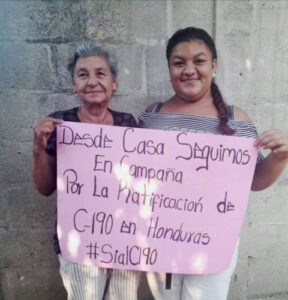
In Honduras, union activists are posting photos of themselves on social media with signs urging passage of C190. Credit: Promotoras Legales
In recommending steps to address violations of women’s rights to freedom of peaceful assembly and association, the report emphasizes the actions “should be grounded in supporting and empowering women’s movements and organizations in all their diversity.”
Governments must ensure adherence to international treaties addressing women’s right to a voice at work and in their communities, Voule said, speaking on a panel today with Solidarity Center Executive Director Shawna Bader-Blau and other civil society leaders. Among its recommendations, the report urges governments ratify International Labor Organization (ILO) Convention 190, which covers gender-based violence and harassment at work, and ILO C189 which recognizes domestic workers’ right at work.
Employers also “have a direct responsibility to respect and protect women’s rights to freedom of peaceful assembly and of association, to act with due diligence to prevent the violations of such rights and to provide women with effective remedies for violations connected to their operations,” the report states.
“Celebrating Women in Civil Society and Activism” builds on the 2016 UN Special Rapporteur report on workers rights that found workers rights—and the freedom to form unions and freely assemble—are key to achieving human rights because without assembly and association rights, workers have little leverage to change the conditions that entrench poverty, fuel inequality and limit democracy.

Oct 8, 2020
Delivery employees in Colombia who work for the online platform Rappi joined protests across Latin America today calling for decent wages, job safety and health protections for gig economy workers. Largely migrant workers from Venezuela, they provide essential services delivering food from restaurants and grocery stores to homes, including during the COVID-19 lockdowns.
The Rappi workers began to organize in response to fluctuating pay rates for individual delivery jobs, unexplained fines levied by the company, and the arbitrary barring of workers from the platform to accept jobs. Workers are seeking to unionize to address these issues and collectively defend their labor rights. Some 81 percent say their only source of income is by working for Rappi.
 Riding motorcycles and bikes through Bogotá, Medellín, Pereira, Cali, Barranquilla, Bucaramanga and Cartagena, the workers culminated their protest at the offices of the Labor Ministry in each city, where they presented a petition to form a union, Union of Platform Workers (UNIDAPP), to secure their fundamental rights on the job.
Riding motorcycles and bikes through Bogotá, Medellín, Pereira, Cali, Barranquilla, Bucaramanga and Cartagena, the workers culminated their protest at the offices of the Labor Ministry in each city, where they presented a petition to form a union, Union of Platform Workers (UNIDAPP), to secure their fundamental rights on the job.
“These platforms derive their profits from the exploitation of hundreds of thousands of men and women around the world who work without rest or protection. for miserable income,” UNIDAPP said in a statement today. “We are workers without rights who go out to the streets day by day to meet the primary needs of this society.”
Even as workers at Rappi struggle to support themselves, Rappi last month raised more than $300 million in a new round of investment involving international funds, such as T. Rowe Price Associates. Rappi operates in nine countries in Latin America. On Mother’s Day in May, more than 4 million Colombians used the Rappi app, as delivery services benefited from increased demand due to social distancing and lockdown restrictions.
Of the 50,000 Rappi workers, almost none are covered by the nation’s safety and health laws, according to a 2019 study, which found that 63.2 percent had suffered work-related accidents and 67 percent contracted occupational diseases in the past two years. At least three workers at Rappi were killed on the job so far in 2020, two from traffic accidents and one during an attempted robbery.
Like gig workers around the world who struggle with low pay, dangerous working conditions and arbitrary treatment, Rappi employees seek passage of laws protecting their rights on the job and labor contracts to ensure those rights are enforced.
Although several bills are now in the Colombian Parliament to regulate digital platforms and require gig economy corporations to provide some basic workplace protections, UNIDAPP rejects the efforts because they were not drafted with worker input and fall far short of the basic protections they need.
The National Movement of Digital Platform Workers (MNRPD) is filing suit on behalf of the workers, seeking recognition of labor contracts that ensure labor rights. The SC collaborates with the MNRPD and provides technical and legal assistance to reinforce the union organizing effort.
UNIDAPP is an affiliate of the Central Workers’ Union (CUT), which heralded the new union, saying “we have a duty to fight for what we want, full workers’ rights, decent conditions of employment and social protection.”
“Today, a new stage begins for platform workers in the country,” UNIDAPP stated. “We are a strong trade union organization ready to bring our demands to all judicial, legal and administrative bodies, until we have labor rights!”
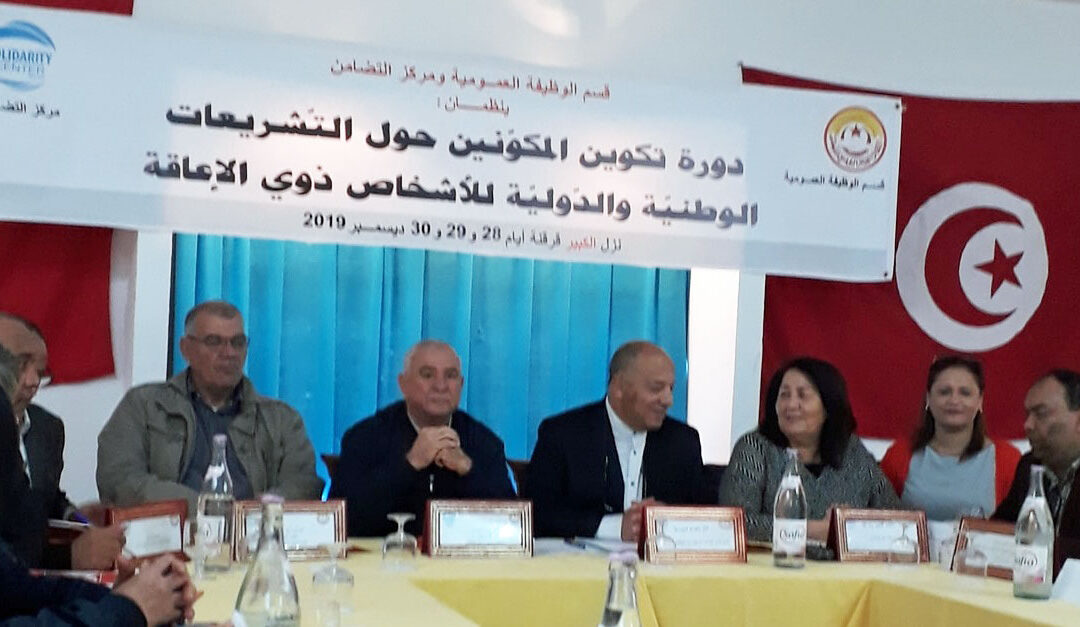
Sep 30, 2020
When the Tunisian Parliament this summer approved a law increasing the percentage of people with disabilities in civil service, union activists and their allies in the disability rights and human rights movements took a moment to celebrate the victory—and to reflect on the five-year advocacy campaign it took to achieve this goal.
“By paying attention to the issues of people with disabilities, working on more information and support for them, and considering their rights an integral part of the human rights system, people with disabilities are able to make valuable contributions to their communities if opportunities are available to them,” the Tunisian General Labor Union (UGTT) said in a statement.
The new law stipulates that no fewer than 5 percent of annual public service assignments for workers with a college degree who have been unemployed for 10 years are allocated to differently abled workers.
Unions, Civil Society Coalition Key to Success
A broad-based partnership with key disability rights activists fueled the campaign’s success. With Solidarity Center support, a 10-member leadership committee of differently abled workers from the UGTT and the Arab Forum for Persons with Disabilities, and a prominent civil society activist steered the project. The committee, half of whom were women, conducted train-the-trainer sessions with union leaders and representatives of organizations focused on the economic and social integration of workers with disabilities who, in turn, held similar trainings across the country.
“The rights of persons with disabilities are an integral part of the human rights system,” says Moanem Amira, assistant secretary general in charge of civil service unions, and coalition partner. Universal Human Rights frameworks, such as the United Nations’ Convention on the Rights of Persons with Disabilities, establish the right of those with disabilities to decent work without discrimination or exclusion.
Building on internationally guaranteed rights, the coalition strategized with workshop participants around the country on crafting campaigns for passage of national legislation. The coalition organized awareness days, including those that focused on the role of unions in reaching workers with disabilities, and mobilized them to achieve their economic and social rights. Workers and rights activists went on to champion the socio-professional inclusion of individuals with disabilities in the workplace and connect with government representatives to monitor and follow up on violations against workers with disabilities.
Dozens of workers with disabilities joined unions throughout the campaign through the outreach of activists such as Nabil Moumni. From his home in Gabes, in southeastern Tunisia, Moumni interviewed workers with disabilities in the public and private sectors to better understand their working conditions, held trainings and shared with workers the benefits of forming unions to achieve their rights.
A disability rights activist since 2012, Moumni says his involvement in the project and the hard work of those involved inspired him “to be a more enthusiastic as an activist.
“Everyone who took part in this project did their very best to reach important outcomes, because now awareness of human rights among trade unionists has reached a stage of maturity that makes the UGTT a locomotive for advocating social issues in Tunisia,” he says.
Moving the Campaign Forward
One billion people, or 15 percent of the world’s population, experience some form of disability, with 80 percent to 90 percent of working age people with disabilities unemployed in developing countries.
Persons with disabilities are more likely to experience adverse socioeconomic outcomes than persons without disabilities, such as under education, a higher drop-out rate, lower levels of professional integration and higher poverty levels.
Early on in the campaign, the coalition conducted a first-of-its-kind survey to examine how workers with disabilities and unions can address discrimination and lack of accessibility for workers in Tunisia. The survey surfaced the immense obstacles workers with disabilities face in finding good jobs. In particular, women with disabilities are challenged by the double burden of sexism and ableism. Sexual harassment, violence and other forms of abuse mean job opportunities can be both scarce and exploitative.
So even while celebrating passage of the new law, coalition members say they are planning to continue working to ensure workers with disabilities can exercise their rights—and already are organizing awareness-raising and advocacy campaigns and building a regional network to support workers with disabilities who can take part in improving their rights at work and in their communities.
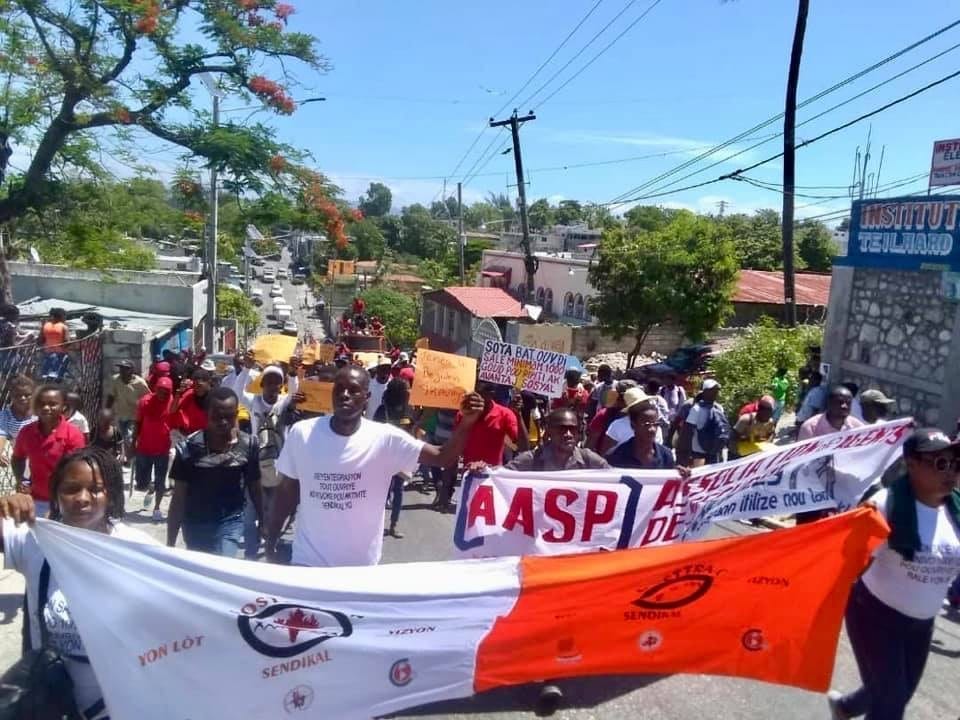
Sep 14, 2020
As the U.S. Congress considers renewal of the Caribbean Basin Trade Partnership Act (CBPTA) for Haiti, labor rights provisions must be enforced for trade benefits to reach 57,000 Haiti garment workers, says Solidarity Center Americas Regional Program Director Lauren Stewart.
Testifying before the House Ways and Means Committee Thursday, Stewart says labor violations persist at garment factories because authorities do not impose or collect fines for infractions and the government has not effectively enforced the law—as also noted in a 2019 U.S. State Department human rights report. Noncompliance with internationally recognized worker rights is among criteria for CBTPA eligibility for beneficiary countries. (Read Stewart’s written testimony here.)
Further, trade preference programs with Haiti, such as the CBTPA, which allows duty-free access for Caribbean countries to the U.S. markets, have not specified labor rights enforcement “in a way that there is actual teeth,” Stewart said.
Solidarity Center union partners in Haiti say trade agreements should specify the amount of time a factory can be in noncompliance before losing its trade preference eligibility, and should be required to demonstrate progress in remedying violations before being readmitted, she says. Further, unions say there should be a limited number of times a noncompliant factory can be admitted to trade preference programs.
Haiti Garment Workers Struggle to Form Unions

Trade preference agreements for Haiti’s garment industry must include enforcement for decent working conditions and freedom to form unions—Lauren Stewart
With labor abuses unaddressed, garment workers endure poor working conditions and low wages: A 2019 Solidarity Center living expense survey estimated the minimum wage for garment workers in Port-au-Prince at least three times less than basic cost of living.
But because the country has a history of repressing worker efforts to form unions to improve working conditions, many workers fear exercising their right to freedom of association.
“Trade preference programs that enforce workers’ right to organize and bargain is critical to improve working conditions in Haiti,” Stewart told committee members.
There is only one authentic collective bargaining agreement in the garment sector—which means “the great majority of workers are unable to negotiate higher wages and lack a voice in shaping the terms of their labor,” Stewart said.
Although the CBTPA and other trade preference programs in the Caribbean Basin Initiative have stimulated Haiti’s garment industry, Stewart says the economic gains of garment industry have not translated into decent wages and working conditions.
Enforcing worker rights provisions in the CBTPA is “critical to guaranteeing internationally recognized worker rights and fostering the rule of law, both of which are necessary to promote stability and economic development in Haiti,” Stewart said.
The CBPTA expires September 30 and Congress is considering its renewal to 2030.
Witnesses also included Republic of Haiti Ambassador Hervé H. Denis, Georges Sassine, Association des Industries d’Haïti board member, Beth Baltzan, principal at American Phoenix Trade Advisory Services and Jerry Cook, Hanesbrands vice president for government and trade relations.

 “Courageous women and organizations are pushing back,” said Bahia Tahzib-Lie, Netherlands Ambassador for Human Rights in her opening remarks. “They make clear that women’s voices can no longer be ignored or silenced.”
“Courageous women and organizations are pushing back,” said Bahia Tahzib-Lie, Netherlands Ambassador for Human Rights in her opening remarks. “They make clear that women’s voices can no longer be ignored or silenced.”









 Riding motorcycles and bikes through Bogotá, Medellín, Pereira, Cali, Barranquilla, Bucaramanga and Cartagena, the workers culminated their protest at the offices of the Labor Ministry in each city, where they presented a petition to form a union, Union of Platform Workers (UNIDAPP), to secure their fundamental rights on the job.
Riding motorcycles and bikes through Bogotá, Medellín, Pereira, Cali, Barranquilla, Bucaramanga and Cartagena, the workers culminated their protest at the offices of the Labor Ministry in each city, where they presented a petition to form a union, Union of Platform Workers (UNIDAPP), to secure their fundamental rights on the job.

